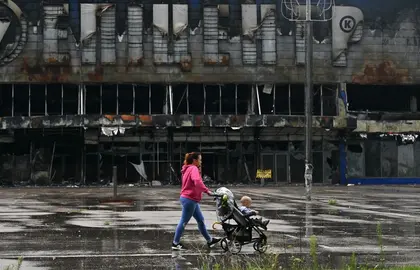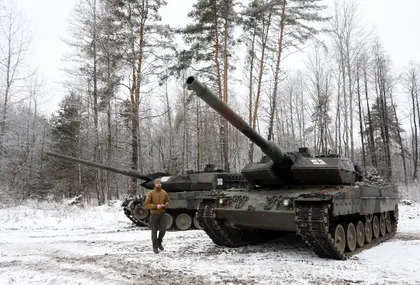The European Parliament has deemed a special tribunal necessary to condemn Russian President Vladimir Putin's war crimes. Meanwhile, Ukraine will be further armed by the West, but Germany has been holding up the supply of Leopard-2 tanks.
Read about these and other events in the weekly review.
JOIN US ON TELEGRAM
Follow our coverage of the war on the @Kyivpost_official.
Tribunal for Putin
The beginning of Russia's full-scale invasion of Ukraine was met with mixed responses from Western countries – on the one hand the U.S., the U.K., Poland, the Czech Republic, Slovakia and the Baltic countries; and on the one hand “old Europe”, notably France and Germany. The result has been patchy practical policy implementation.
“Old Europe" has thus far given Russia the opportunity to save face through a veto on the supply of offensive weapons to Ukraine and numerous calls for peace negotiations. Indeed, prior to February 2022, the idea that the Kremlin would be responsible for launching an aggressive war against Ukraine was pooh-poohed by certain French and German politicians, and members of the elite in those countries.
The subsequent and terrible tragedies in places such as Bucha, relentless missile attacks, including attempts by Russia to freeze Ukrainians by attacking energy infrastructure, and subsequent trips by Western leaders to Ukraine, psychologically "broke" some pro-Russian politicians from old Europe.
They are now convinced that i) Russia is an aggressive country that has no place in the single European civilization, nor in its cultural and informational space; ii) it is impossible to do business with Russia “as usual”; and iii) Russian President Vladimir Putin only understands force.

Russian Air Attack Kills Nine in Sumy Region
Such a psychological breakdown has also led to significant changes in the politics of Western countries. Initially, there were cautious consultations on the creation of a separate tribunal to consider the war crimes of the Russian Federation; then the decision of various parliaments, including the European one, to recognize Russia as a terrorist state.
The Dec. 13 statement by the G7 group of nations was a turning point, which emphasized that “war crimes and other atrocities cannot go unpunished.” It added, “we will bring President Putin and those responsible for this to justice in accordance with international law.”
The terrible tragedy in Dnipro on Jan. 16, where 46 innocent Ukrainians were killed as a result of a Russian missile attack on a residential building, undoubtedly affected the mood of members of the European Parliament. On Jan. 19, with 472 "yes" votes, MEPs adopted a resolution: the European Union (EU) should seek the creation of a special international tribunal to prosecute the crime of aggression against Ukraine committed by the political and military leadership of Russia.
The U.K. is among the leaders of this process and, surprisingly, Germany. It is clear that the creation of a special tribunal is a rather difficult and a long way away, because all previous, similar judicial bodies (in particular, in Yugoslavia and Rwanda) were created by the United Nations (UN) Security Council.
Since Russia has the right of veto in this body, the Security Council remains blocked and cannot make any decision regarding the war in Ukraine. To resolve the “Gordian knot” of the veto, strong global support is needed, not only from individual countries, but also from international organizations.
Without any doubt, evil will be punished, Putin and his henchmen will suffer a well-deserved punishment for the murders of tens of thousands of Ukrainians, the atrocities and torture committed against peaceful citizens, and the enormous destruction and suffering Russia has caused in Ukraine.
And this punishment will certainly be just.
Weapons for Ukraine
“The decisive moment of the Russian-Ukrainian war has come,” said U.S. Defense Minister Lloyd Austin. The latest events regarding the supply of weapons to Ukraine prove that the collective West has "made a decisive bet" on its victory and will supply as many weapons and military equipment as is necessary to achieve Ukraine’s victory.
Military plans and schedules for the delivery of weapons have been set out. Commander-in-Chief of the Armed Forces of Ukraine (AFU), General Valerii Zaluzhnyi, left the borders of Ukraine for the first time since the beginning of the war to meet with his colleague, the chairman of the Joint Chiefs of Staff of the United States, General Mark Milley.
CIA director William Burns came to Ukraine on a secret visit, and he undoubtedly shared all the necessary intelligence with the top military and political leadership of Ukraine.
The first half of January could be called "the time of good news from abroad," which Ukrainians have badly needed against the background of the latest tragedies in Dnipro and Brovary.
Information Defense experts have summarized the main types of weapons that Ukraine will receive in various aid packages from different countries.
Table 1: Weapons and military equipment expected to soon be transferred to Ukraine
* Data are indicative and are subject to change. Different sources indicate different amounts of weapons and military equipment to be delivered and not all information about shipments has been made public.
Whilst not an exhaustive list, it gives an understanding of how serious this contribution is in increasing the AFU’s combat capability. As noted by military experts, the supply of weapons to Ukraine is based on the offensive needs of the country. Whole sets of weapons for equipping mechanized assault brigades, which are used to break through enemy strongholds, are arriving in Ukraine.
Germany remained adamant last week about not supplying Leopard-2 tanks to Ukraine. The decision to grant permission for the re-export of German combat vehicles to Ukraine from other countries was not made either. In defiance of this, Poland declared that it would deliver Leopard-2 tanks to Ukraine without the permission of the German government. On Jan. 22, Germany’s Foreign Minister Annalena Baerbock said that Germany “will not stand in the way” of a Polish request to send Leopard-2 tanks to Ukraine.
The German government has been largely guided by public opinion in the country, with its people largely opposed to the supply of tanks to Ukraine. However, the elite must look beyond the mood of its own people and form strategic goals, the achievement of which must sometimes be accompanied by certain sacrifices.
After all, there are countries that have done everything they could. Denmark transferred to Ukraine all of its 19 Caesar self-propelled guns, and Estonia all of its available howitzer artillery.
I am convinced that Leopard-2 battle tanks will still be delivered to Ukraine and will play a key role in its liberation from the Russian invaders.
Today, another question is on the agenda – when will the collective West dare to supply Ukraine with modern F-16 fighters?
I'm sure it's only a matter of time. But during that time there will be thousands more sacrifices of Ukrainians.
Ihor Zhdanov is a co-founder of the Open Policy Foundation, a non-government organization (NGO) in Ukraine.
The views expressed are the author’s and not necessarily of Kyiv Post.
You can also highlight the text and press Ctrl + Enter










